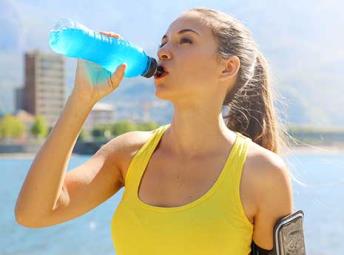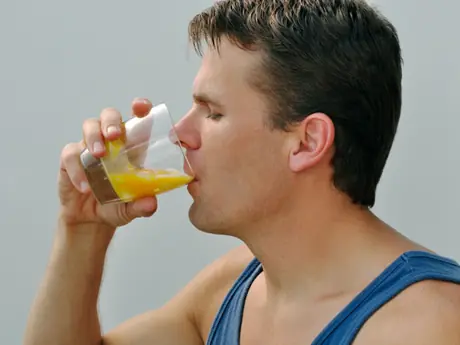By the same token, if your stomach tells you drinking anything at the moment isn't a good idea, then don't drink even if you are thirsty. Runners commonly find themselves in this situation in the last few miles of a marathon. If you can get through 20 miles before your stomach says "no more," you're doing OK.
Choose Sports Drink
As for what to drink, it's almost always preferable to choose the sports drink offered at aid stations instead of water. The reason: Sports drinks contain carbohydrate, and carbohydrate enhances marathon performance more than water. One study reported that runners completed a marathon 4 minutes faster, on average, when they consumed water and carbs together than they did when they drank plain water.
More: What Makes a Good Sports Drink?
To get the maximum benefit from carbohydrate intake during a marathon you need to take in at least 60 grams per hour. Most runners aren't able to drink enough sports drink to get this much carbohydrate. You'd have to drink 33 ounces of a typical sports drink per hour to get 60 grams of carbs. Fortunately, you can still get a significant performance benefit from 30 grams of carbs per hour, which requires a more manageable 16 ounces of sports drink.
More: The Role of Carbohydrates in Recovery
If you have a strong stomach and can tolerate a fairly high level of nutrition intake while running, you can achieve the optimal rate of 60 grams of carbohydrate intake per hour by supplementing the sports drink offered along the course with energy gels. A typical energy gel contains 25 grams of carbs per packet. If you consume one gel packet per hour in addition to drinking the sports drink by thirst, you'll likely reach the magical 60 grams-per-hour threshold.
If you have a weaker stomach and can take in only modest amounts of water and carbs without GI discomfort, don't panic. Just do what you can and remind yourself that Amby Burfoot won the 1968 Boston Marathon without drinking anything.
More: What to Drink, How Much and How Often
 Perfect your nutrition to boost your performance. Sign up for a race near you.
Perfect your nutrition to boost your performance. Sign up for a race near you.
- 2
- of
- 2
About the Author








Discuss This Article